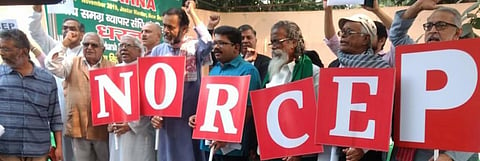

India on November 4 said it would not sign the Regional Comprehensive Economic Partnership (RCEP) as its concerns were nto addressed, according to sources.
Fifteen other countries are now set to enter into the trade agreement in February 2020.
Heads of 16 negotiating countries, gathered at the RCEP Summit in Nonthaburi, Thailand, were slated to sign the deal on November 4, but failed to reach an agreement that would suit all interests.
Since United States President Donald Trump withdrew from the Trans-Pacific-Partnership in 2017, there was renewed focus on RCEP to boost trade and member countries pushed for a prompt agreement. India was not ready for an earlier target of 2018. Prime Minister Narendra Modi sought more time and emphasised the need for a comprehensive deal that took care of everyone’s interest, said Rajiv Bhatia from Gateway House.
The deadline was postponed to 2019 but India was unable to draw sufficient safeguard to protect its industry from cheap Chinese products. It proposed a three-tier tariff system, proper understanding of source of origin (SOO) and a deal for the services sector. Other countries, however, disagreed. At one point, a group of countries such as Malaysia pushed for concluding the deal even if India didn't participate. Others like Indonesia, however, disagreed, Bhatia said.
A range of sectors — including agriculture, dairy, solar industry, seeds, garments, etc — in India have protested against the deal. Those opposed to the agreement felt vindicated at that teh agreement did not go through. The failure to reach a deal in Nonthaburi was a victory for people’s movements, Ranja Sengupta from the Forum for Trade Justice said.
“It was a sign that the hundreds of protests across the country led by farmer’s movements, trade unions and other groups forced the Indian government to back off from signing this unequal treaty. The attempt now was to conclude the RCEP by February 2020 and people’s movements will continue to put pressure on the government to permanently withdraw from free trade deals such as the RCEP and work towards building a more equitable, just and inclusive trade policy,” she said.